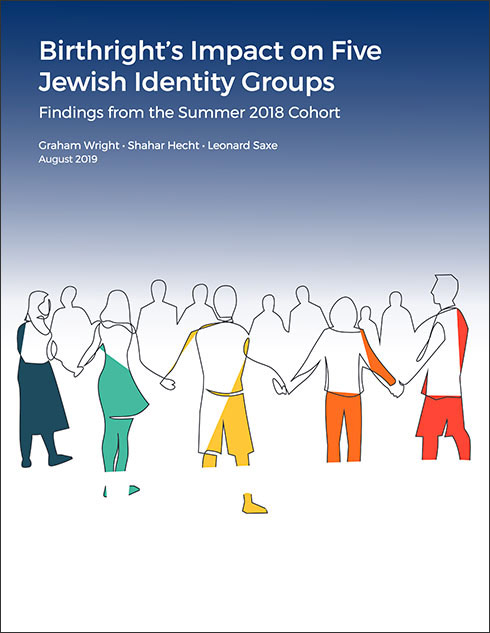Birthright's Impact on Five Jewish Identity Groups: Findings from the Summer 2018 Cohort
Graham Wright, Shahar Hecht, and Leonard Saxe
August 2019
 By examining response patterns to questions about Jewish attitudes, the study identified five different types of Jewish identity among the young adults who applied to go on a Birthright trip in summer 2018: Ancestry, Secular Peoplehood, Casual Religious, Connected, and Committed. After sorting applicants into groups corresponding to their Jewish identity type, the study examined the ways in which participants in the different groups were impacted by their Birthright experience. Specifically, the study asked:
By examining response patterns to questions about Jewish attitudes, the study identified five different types of Jewish identity among the young adults who applied to go on a Birthright trip in summer 2018: Ancestry, Secular Peoplehood, Casual Religious, Connected, and Committed. After sorting applicants into groups corresponding to their Jewish identity type, the study examined the ways in which participants in the different groups were impacted by their Birthright experience. Specifically, the study asked:
What distinguishes different types of Jewish identity? Do participants with different types of Jewish identity vary in their views of the Birthright experience? Does Birthright influence participants with different types of Jewish identity to the same extent or in the same ways? If not, what are the differences?
The report draws on survey data collected from a pair of surveys sent to US and Canadian young adults who applied to go on Birthright Israel trips during summer 2018: A pre-trip survey (N=10,616) conducted in spring 2018 and a post-trip survey (N=4,396) conducted in fall 2018. Both surveys included individuals who participated in the programs and those who did not.
Expand All
-
The five identity groups were represented among respondents as follows: Ancestry (17%), Secular Peoplehood (23%), Casual Religious (20%), Connected (29%), and Committed (11%).
-
The Ancestry group had the weakest Jewish identity, followed by the Secular Peoplehood and Casual Religious groups. The Connected group had a stronger Jewish identity and the Committed group had the strongest of all.
-
The Ancestry and Secular Peoplehood groups shared a relatively negative view of religion and Jewish religious practice compared to the Casual Religious, Connected, and Committed groups that share a positive view of religion and Jewish religious practice.
-
Concerns over antisemitism and efforts to counter it were more central to the Jewish identity of the Secular Peoplehood, Connected, and Committed groups than for the Ancestry and Casual Religious groups.
-
In all five groups, a majority of Birthright participants called the trip “one of the best experiences of my life” and recommended the trip to friends and family. A majority in all five groups also gave very high ratings to the bus community and the Israeli tour educator and had positive views of their interactions with the North American staff and the Israelis on the bus. Participants from the Connected and Committed groups tended to be the most positive in their reactions to the trip.
-
The majority of participants in all five groups reported that after the trip they kept in touch with other North American participants from their bus, the Israelis, and their staff. Participants in the Ancestry group were the least likely to keep in contact with others from their bus community.
-
Overall, Birthright strengthened participants’ connection to Israel, to Jewish communities, and to their Jewish identities. Birthright’s impact on connection to Israel and on understanding the current situation in Israel was evident among all five groups. Birthright’s impact on strengthening connections to Jewish communities and participants’ Jewish identity was concentrated among the Ancestry, Secular Peoplehood, and Casual Religious groups.
-
The study found that Birthright had an impact on virtually all participants, despite their disparate Jewish identities. At the same time, although participants with weaker forms of Jewish identity returned from the trip more engaged in Jewish life than before they left, these changes were not always large enough to overcome their pre-trip deficit compared to those with stronger forms of Jewish identity.
For Israel-related outcomes however, Birthright’s impact was often so large that it did overcome pre-trip differences among groups.
 By examining response patterns to questions about Jewish attitudes, the study identified five different types of Jewish identity among the young adults who applied to go on a Birthright trip in summer 2018: Ancestry, Secular Peoplehood, Casual Religious, Connected, and Committed. After sorting applicants into groups corresponding to their Jewish identity type, the study examined the ways in which participants in the different groups were impacted by their Birthright experience. Specifically, the study asked:
By examining response patterns to questions about Jewish attitudes, the study identified five different types of Jewish identity among the young adults who applied to go on a Birthright trip in summer 2018: Ancestry, Secular Peoplehood, Casual Religious, Connected, and Committed. After sorting applicants into groups corresponding to their Jewish identity type, the study examined the ways in which participants in the different groups were impacted by their Birthright experience. Specifically, the study asked: